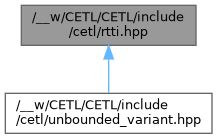|
|
template<typename T> |
| auto | cetl::detail::has_type_id_impl (int) -> decltype(std::decay_t< T >::_get_type_id_(), std::true_type{}) |
| |
|
template<typename T> |
| auto | cetl::detail::has_cast_impl (int) -> decltype(std::declval< std::decay_t< T > & >()._cast_(std::declval< type_id >()), std::true_type{}) |
| |
|
template<std::uint8_t... Bytes> |
| constexpr type_id | cetl::detail::type_id_type_value_impl (const type_id_type< Bytes... >) noexcept |
| |
| template<typename TypeIDType> |
| constexpr type_id | cetl::type_id_type_value () noexcept |
| |
| template<typename T> |
| constexpr type_id | cetl::type_id_getter () noexcept |
| |
| template<> |
| constexpr type_id | cetl::type_id_getter< void > () noexcept |
| |
| template<typename _u> |
| CETL_NODISCARD std::enable_if_t< is_rtti_convertible< _u >, bool > | cetl::is_instance_of (const _u &obj, const type_id &id) noexcept |
| |
| template<typename Q, typename _u> |
| CETL_NODISCARD std::enable_if_t< is_rtti_convertible< _u >, bool > | cetl::is_instance_of (const _u &obj) noexcept |
| |
|
| template<typename T, typename _from> |
| CETL_NODISCARD std::enable_if_t< is_rtti_convertible< _from > &&std::is_pointer< T >::value &&has_type_id< std::remove_pointer_t< T > >, T > | cetl::rtti_cast (_from *const obj) noexcept |
| |
| template<typename T, typename _from> |
| CETL_NODISCARD std::enable_if_t< is_rtti_convertible< _from > &&std::is_pointer< T >::value &&has_type_id< std::remove_pointer_t< T > >, const std::remove_pointer_t< T > * > | cetl::rtti_cast (const _from *const obj) noexcept |
| |
An explicit mechanism for implementing dynamic type introspection for high-integrity systems.
This should be used instead of standard C++ RunTime Type Information (RTTI) (i.e. -fno-rtti) where a codebase must trace from lines of source back to verifications (correctness) and requirements (suitability).
- Copyright
- Copyright (C) OpenCyphal Development Team <opencyphal.org> Copyright Amazon.com Inc. or its affiliates. SPDX-License-Identifier: MIT

